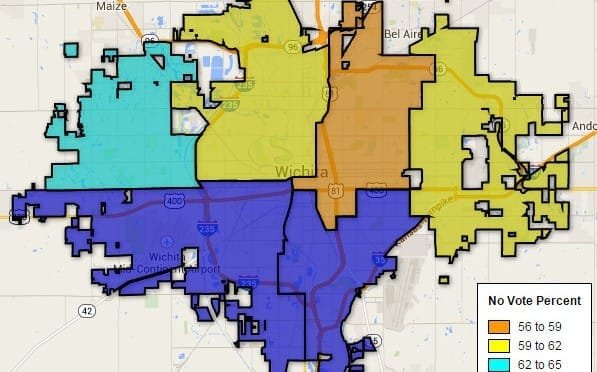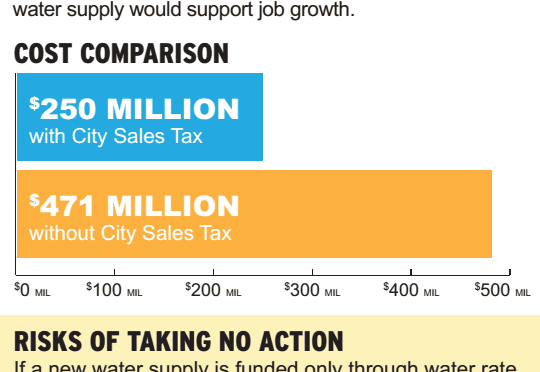The Wichita city council has been busy with economic development items, and more are upcoming.
At the November 25 meeting of the Wichita City Council, on the consent agenda, the council passed these items.
Approved a sublease in a warehouse. This action was necessary as the incentivized warehouse pays no property taxes due to a subsidy program. Given tax costs and industrial building rents, this policy gives these incentivized buildings a cost advantage of about 20 to 25 percent over competitors. That’s very high, and makes it difficult for existing buildings to compete. This lease is for 40,500 square feet for annual rent of $196,425.00, which is $4.85 per square foot. Competing warehouse space might be able to charge rent of $4.25 plus property tax of about $1.00, for a total rent of $5.25 per square foot to the tenant. In the case of the subsidized building, the landlord collects $4.85 instead of $4.25, and the tenant pays $4.85 instead of $5.25. Everyone’s happy. Everyone, that is, except for existing industrial landlords in Wichita — especially those with available space to rent — who must be wondering why they attempt to stay in business when city hall sets up subsidized competitors with new buildings and a large cost advantage. Then, other commercial tenants must be wondering why they don’t get discounted rent. Taxpayers must be wondering why they have to make up the difference in taxes that the subsidized tenants aren’t paying. (On second thought, these parties may not be wondering about this, as we don’t have a general circulation newspaper or a business newspaper that cares to explain these things.) See Wichita speculative industrial buildings.

Set December 16 as the date for the public hearing on the formation of a community improvement district. This district is for the benefit of the River Vista project, the proposed apartments on the west bank of the Arkansas River between Douglas and First streets. CIDs redirect sales tax revenue from general government to the developers of the project. Say, does anyone remember Charter Ordinance No. 144, which says this land “shall be hereafter restricted to and maintained as open space”? See In Wichita, West Bank apartments seem to violate ordinance.
Also on that day, during its workshop, the council heard items for the city’s legislative agenda. I have a several articles covering these topics as they relate to the legislative agenda: Airfares, passenger rail, cultural arts districts, and economic development.
On its December 2 agenda, the council has these items:
Property tax and sales tax exemptions for Bombardier Learjet. The council may grant property tax discounts worth as much as $268,548 per year for up to ten years, according to city documents. This will be split among taxing jurisdictions as follows: City $72,389, State $3,340, County $65,415, and USD 259 $127,404. The purchased items may also receive an exemption from sales tax, but city documents give no amount. Bombardier boasts of “Investing in the communities where we do business to ensure we have strong contexts for our operations” and “We support our home community through donations, sponsorships and our employee volunteering program.” Evidently this commitment to investment and support does not extend to shouldering the same tax burden that everyone else does.
Property tax exemptions for Cessna Aircraft Company. The council may grant property tax discounts worth as much as $302,311 per year for up to ten years, according to city documents. This will be split among taxing jurisdictions as follows: City $81,491, County $73,639, State $3,760, and USD 259 $143,421. Generally, items purchased with proceeds of the IRB program also receive sales tax exemption, but city documents do not mention this. Cessna speaks of its commitment to the communities where it operates, but evidently this commitment does not extend to shouldering the same tax burden that everyone else does.

Forgivable loan to Apex Engineering International. The Wichita Eagle reported that this company “has been growing briskly and adding employees.” Still, the company seeks incentives, in this case a forgivable loan from the city of $90,000. It will ask Sedgwick County for the same amount. These loans are grants of cash that do not need to be repaid as long as goals are met. Three years ago Apex received $1,272,000 in tax credits and grants under programs offered by the State of Kansas. It is not known at this time if Apex is receiving additional subsidy from the state. According to a company news release, “AEI was nominated for the Wichita Metro Chamber of Commerce 2012 Small Business Awards. This prestigious award recognizes two companies each year who are selected based on specific criteria including: entrepreneurship, employee relations, diversity, community contribution and involvement, and leadership and performance.” Maybe we can justify this grant as repayment for Apex’s community contribution. This forgivable loan may receive resistance from some council members. Current council member and mayoral candidate Jeff Longwell (district 5, west and northwest Wichita) was recently quoted in the Wichita Eagle as wanting a “moratorium on forgivable loans right now until we can reassess the way that we do economic development.” While campaigning for his current office, Council member Pete Meitzner (district 2, east Wichita) told an audience “I am not for forgivable loans.” He noted the contradiction inherent in the terms “forgivable” and “loan,” calling them “conflicting terms.” Meitzner has said he will run for his current office again.
Set January 6 as the date for the public hearing regarding the project plan for the Mosely Avenue Project TIF district in Old Town. This TIF district is a project of David Burk and Steve Barrett. Burk has received millions of taxpayer dollars in subsidy. But he’s not finished.
Consider whether to raise water bills by about 5 percent.
Consider a new lease agreement with Museum of World Treasures, Inc. which will, among other things, reduce the museum’s rent paid to the city from $60,000 per year to $1.
Consider passing the legislative agenda. See above for more on this topic.












 This claim — that the mill levy has not been raised for a long time — is commonly made by the city and “Yes Wichita” supporters. It’s useful to take a look at actual numbers to see what has happened.
This claim — that the mill levy has not been raised for a long time — is commonly made by the city and “Yes Wichita” supporters. It’s useful to take a look at actual numbers to see what has happened. Apart from the focus on the mill levy, voters may want to know that the dollars of property tax the city collects has risen. This growth comes from new property being created (although old property disappears, too), and from increases in assessed value of existing property. From 1994 to 2011 property tax revenue increased from $58.672 to $119.745 million, or 104 percent. We didn’t experience anything near that rate of growth in the combination of population or inflation. It’s true that these values have slowed in growth or even declined in recent years. But that’s a symptom of the problem: When tax revenue increases, so to does spending, and we become accustomed to a certain level. When revenue increases don’t keep pace with history, government finds it difficult to make the necessary cuts.
Apart from the focus on the mill levy, voters may want to know that the dollars of property tax the city collects has risen. This growth comes from new property being created (although old property disappears, too), and from increases in assessed value of existing property. From 1994 to 2011 property tax revenue increased from $58.672 to $119.745 million, or 104 percent. We didn’t experience anything near that rate of growth in the combination of population or inflation. It’s true that these values have slowed in growth or even declined in recent years. But that’s a symptom of the problem: When tax revenue increases, so to does spending, and we become accustomed to a certain level. When revenue increases don’t keep pace with history, government finds it difficult to make the necessary cuts.
